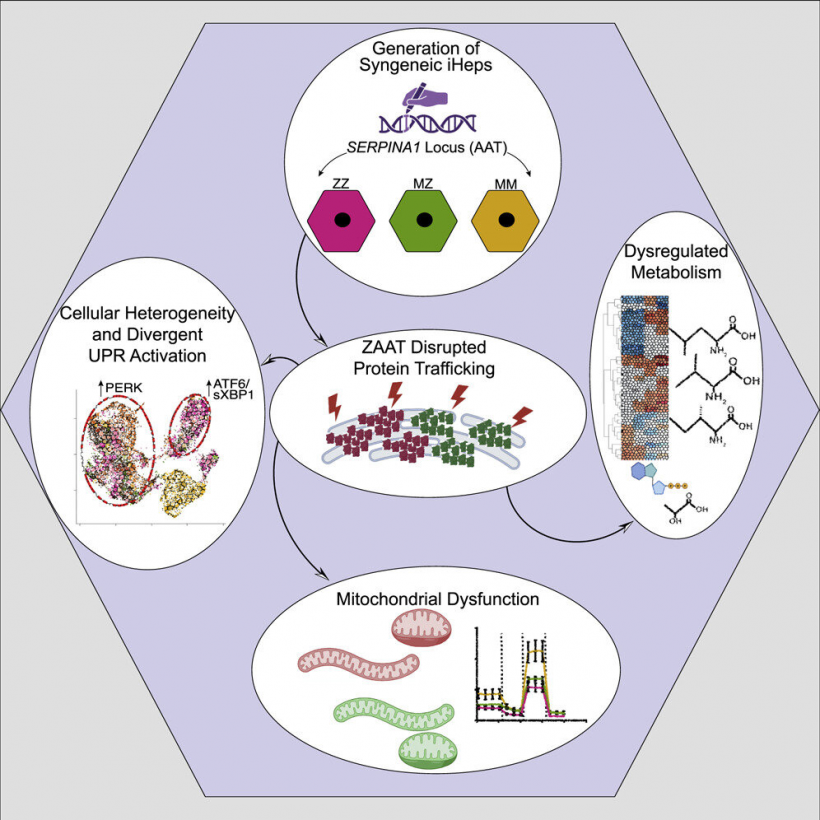Alpha-1 antitrypsin depletion (AATD) is a significant yet underappreciated hereditary cause of liver disease. The most prevalent mutation related to liver illness is the Z mutation, which results in improper processing and a large buildup of the AAT protein inside liver cells that are the major cell type accountable for manufacturing AAT.
While people with homologous pairs of the Z-mutation ("ZZ"s) have long been recognized to have an elevated risk of liver illness, it has recently been obvious that those with a small chunk of the Z-mutation ("MZ"s) also have an elevated incidence.
New research from Boston Medical Center as well as Boston University Chobanian & Avedisian School of Medicine discovered that an increase in protein processing resulted in significant downstream modifications in MZ iHep cell activities, which include impairment in metabolic and mitochondrial function, and that these changes resembled their diseased ZZ rather than MM counterparts.
Examining AATD Cells
These findings, described in Cell Reports, present the first indication that AAT digestion is disrupted not just in ZZ, but also in MZ, human hepatocytes, and that these alterations may be contributing to the higher clinical liver illness found in both types of patients.
As per Joseph Kaserman, MD, lead researcher, an associate medical professor at BU Chobanian & Avedisian School of Medicine, as well as scientist in the Wilson Lab at the BU/BMC Center for Regenerative Medicine, an estimated 2% of the US population might be carriers for the Z allele (CReM). They are now able to investigate parts of this disease that were previously impossible to examine, and such results will go a considerable distance in assisting us to understand plus ultimately treat this condition.
Induced pluripotent stem cells (iPSCs) allowed researchers to examine AATD in cells obtained from people with the illness since they carry all of the individual's genetic makeup (including mutations like the Z mutation) and can create every cell type in the body, including liver cells. CRISPR/Cas9 technology, which allows for precise DNA editing, can also be utilized to repair one (MZ) or even both (MM) instances of the Z-mutations, resulting in cells that are genetically identical but for the mutant AAT protein. For the first time, researchers were able to examine the implications of a specific Z allele on human hepatocyte biology.

Graphical Abstract. A study discovered mutations that may lead to an increase in liver disease in patient groups.
AATD-Related Liver Disease
Upon transforming these cells into iPSC-derived hepatocytes (iHeps) via a procedure known as directed differentiation, scientists discovered that somehow a single copy of the Z mutation was enough to drastically affect AAT protein processing.
As reported by Medical Xpress, continued study is needed to determine the precise processes and systems that relate the delayed Z protein to hepatocyte dysfunction. Furthermore, while all people with the Z mutation produce the aberrant protein, only a subset of them acquire a clinical illness, indicating that there are many other mechanisms at work - researchers want to know what is preventing or contributing to sickness in the cells.
As there are no disease-specific therapies for people with AATD-related liver disease, it is critical for these patients that authors gain a better understanding of what is going on in most cells so that researchers all can potentially recognize potential therapeutic strategies in the coming years, added Andrew Wilson, MD, lead researcher, pulmonologist, board member of The Alpha-1 Center at Boston Medical Center, and associate professor of medicine at BU Chobanian & Avedisian School of Medicine.
RELATED ARTICLE: Alcohol Consumption Linked to Increased Risk of Liver Disease Among Obese People, Study Reveals
Check out more news and information on Medicine and Health in Science Times.














